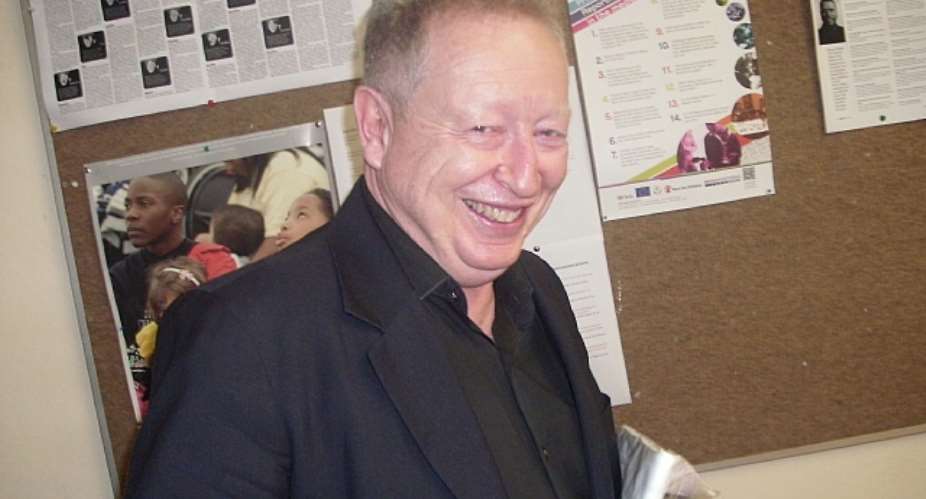High levels of corruption are the conversation of the day in South Africa, a country respected on the African continent for her economic buoyancy and thriving democracy.
One reason for corruption's higher profile has been the strong stance taken by Thuli Madonsela, the official Public Protector, who heads the country's ombudsman service. Her record in pursuing corruption complaints since her appointment two years ago has taken the ruling ANC government by surprise and gained wide public acclaim.
However, David Lewis, Executive Director of Corruption Watch, a new anti-graft institution, has no confidence in the country's success in fighting corruption, citing South Africa's steady decline in corruption indexes, including Transparency International's Corruption Perception Index.
“I don't think anybody is at all confident that we are winning the war against corruption,” he said.
According to him, the work of the Public Protector has contributed to a general public outrage against corruption, but “I think people still feel they are politically protected and they'll get away with it [corruption]… and that's what have got to change”.
Lewis was addressing a group of financial journalists from Ghana, Nigeria, Kenya, Uganda and Zambia, who are attending an Advanced Reporting Workshop on Finance and Governance.
The program, held at South Africa's Institute for the Advancement of Journalism (IAJ), is being organized by the Thomson Reuters Foundation and the Norwegian Agency for Development Cooperation (NORAD).
The issue of corruption, according to David, is generating “huge economic and reputational damage to the country's political institutions”.
There are on-going investigations and prosecutions of cases of “mega corruption”, including scandals which have implicated Police Chiefs and the sitting president, Jacob Zuma.
There is also the everyday experience of many rich, middle class and poor South Africans who are exposed to what has “inappropriately” been tagged “petty corruption”.
According to a report by Willie Hofmeyr, head of the Special Investigating Unit, an independent statutory body, at least 20 percent of the government's procurement budget is lost to corruption.
“There are investigations that the special investigations unit is conducting into government procurement contracts worth about R9bn that are said to have been corrupted in some deep way”, David Lewis stated.
South Africa has a strong constitution, an independent judiciary, robust media and fairly strong civil society. The Congress of South African Trades Unions (COSATU) has also been most vocal in the fight against corruption.
The efforts of these key pillars have however not helped in easing the environment of corruption.
Until recently, there had not been powerful voices within government against corruption.
Corruption Watch wants to assist the public to hold public officials accountable through the establishment of a “large interactive website” for the collation, analysis and disseminate of information on corrupt practices.
The platform, he envisaged, will collaborate with mainstream media and other interest groups to generate campaign on public exposé on corruption – in addition to investigating hotspot allegations of corruption.
Kofi Adu Domfeh reporting from Joburg-South Africa





 SSNIT must be managed without gov’t interference – Austin Gamey
SSNIT must be managed without gov’t interference – Austin Gamey
 Ejisu by-election could go either way between NPP and independent candidate — Gl...
Ejisu by-election could go either way between NPP and independent candidate — Gl...
 We never asked ministers, DCEs to bring NPP apparatchiks for returning officer r...
We never asked ministers, DCEs to bring NPP apparatchiks for returning officer r...
 No one denigrated the commission when you appointed NDC sympathizers during your...
No one denigrated the commission when you appointed NDC sympathizers during your...
 Used cloth dealers protests over delayed Kumasi Central Market project
Used cloth dealers protests over delayed Kumasi Central Market project
 A/R: Kwadaso onion market traders refuse to relocate to new site
A/R: Kwadaso onion market traders refuse to relocate to new site
 Dumsor: Corn mill operators at Kaneshie market face financial crisis
Dumsor: Corn mill operators at Kaneshie market face financial crisis
 Jamestown fishermen seek support over destruction of canoes by Tuesday's heavy d...
Jamestown fishermen seek support over destruction of canoes by Tuesday's heavy d...
 Election 2024: EC to commence voter registration exercise on May 7
Election 2024: EC to commence voter registration exercise on May 7
 Public schools rebranding: We’re switching to blue and white, we’re painting all...
Public schools rebranding: We’re switching to blue and white, we’re painting all...
